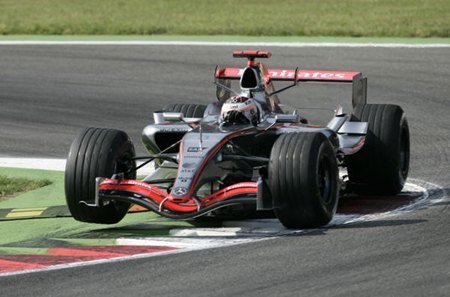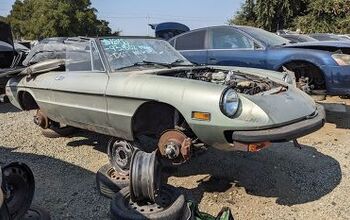F1: The End of an Era
Once again, the queen of motor sports is in transition. Big, well-funded manufacturer teams– Ferrari, Mercedes, BMW, Renault and (yes) Toyota, etc.– are doing a Reagan: spending their less well-funded opponents into oblivion. To wit: Jordan, Minardi and (yes) Jaguar are no more. This creeping consolidation will certainly fuel the anger of those fans who’ve long claimed that big business is killing F1’s spirit. While it’s sad to see the privateers leave the circus after decades of noble competition, F1’s commercialization is actually good news. It will lead to a more engaging and closer battle between the teams.
The manufacturers’ motivation is stronger than the smaller independent teams’. A Mercedes racecar that suffers constant reliability problems will negatively reinforce the connection to the brand— an association that Mercedes doesn’t need and can’t afford. A Renault that can beat a Ferrari adds luster to the French brand, stimulating the patriotism upon which the automaker depends. The stakes are higher than mere trophies on a shelf, as F-1 becomes a showcase of a brand's image, for good or worse.
Toyota, who made their team from scratch (as is their style in such things), is throwing billions of dollars into the game, looking for a championship to burnish their reputation for quality and reliability. BMW, who bought Sauber when Williams couldn’t get the job done, want to have the ultimate driving machine in the ultimate sporting arena. Honda, although it has a very successful past in F-1 with McLaren and BAR, now needs to prove that a Honda can earn the ultimate accolade. Again, Mercedes purchase of the McLaren team shows their full-on commitment to set a world standard on a world stage.
In recent years, Ferrari has dominated F1. Their excellent engineers, drivers and teamwork have brought the marque well-deserved glory. But anyone who follows the sport closely knows that Ferrari also has a strong hand behind-the-scenes. This year’s FIA ban on the Renault cars’ active dampers resembles the ban on mechanical differential brakes in the Mclaren-Mercedes cars. Some say Ferrari had a hand in both decisions. I’m not saying Ferrari is manipulating the rules to secure a competitive advantage, but I’m not saying they’re not either. Changing the rules mid-season is not only confusing and detrimental to the long-term planning for engineers but also upsets the naturally evolving battle for technical supremacy.
The need to keep Ferrari (and the money derived from Ferrari) in the sport is quickly becoming less important than the money pouring into the game by the other manufacturer teams. Ferrari still has some cards to play both on and off the track, but time is running out. The years ahead will certainly see many more Ferrari victories, and the strong likelihood of a world champion in the person of Kimmi Räikonnen, but the team will eventually face a more competitive battle for F1 supremacy.
The new manufacturers’ teams have more money and resources than the Italians. As a result, we’re already seeing a better grid; the qualifying grid at Monza was closer than we’ve seen in a long time. Finishing positions are also in flux. Jenson Button’s recent win and the podium for Kubica in Monza show that new names are making the grade. Look for these trends to continue—to the benefit of both F1 race fans and the teams themselves.
There is a bump in the road: recent changes in the rules of the F1 game banning engine development and selecting only one tire manufacturer. These changes will slow down the pace of development. Short term, they will help Ferrari, Red Bull and Cosworth. In the longer term, the rules will favor the strongly committed factory teams. But if history is any indication, no rules can really stop the engineers from getting around them and making better cars.
The change in teams is being accompanied by a radical change in F1’s commercial sponsorship. There has been an momentous shift away from the traditional tobacco sponsors (that used to be so important to be included in team names) to more high-tech sponsors such as HP, AMD and Intel. Teams using Intel chips in their trackside computers or engineering mainframes connect the chipmaker’s brand name to the team's success. Despite Ford’s withdrawal from the sport, the automotive industry is still investing heavily in the sport. In fact, Formula One is sealing its reputation as a top showcase for brands and manufacturers– for what they stand for and what we associate them with. And that’s why the sport’s remains vibrant.
More by Andras Libal
Latest Car Reviews
Read moreLatest Product Reviews
Read moreRecent Comments
- Kjhkjlhkjhkljh kljhjkhjklhkjh Elon hates bad press (hence TWITTER circus) So the press jumping up and down screaming ''musk fails cheap EV'' is likely ego-driving this response as per normal ..not to side with tesla or musk but canceling the 25k EV was a good move, selling a EV for barely above cost is a terrible idea in a market where it seems EV saturation is hitting peak
- 1995 SC Wife has a new Ridgeline and it came with 2 years so I don't have to think about it for a while.My FIAT needed a battery (the 12V...not the drive battery), a replacement steering column cover and I had to buy a Tesla Charging adapter to use the destination charger at one of the places I frequent. Also had to replace the charge cable because I am an idiot and ran the stock one over and destroyed the connector. Around 600 bucks all in there but 250 is because of the cable.The Thunderbird has needed much the past year. ABS Pump - 300. Master Cylinder 100. Tool to bleed ABS 350 (Welcome to pre OBD2 electronics), Amp for Stereo -250, Motor mounts 150, Injectors 300, Airbag Module - 15 at the u pull it, Belts and hoses, 100 - Plugs and wires 100, Trans fluid, filter and replacement pan, 150, ignition lock cylinder and rekey - 125, Cassette Player mechanism - 15 bucks at the U Pull it, and a ton of time to do things like replace the grease in the power seat motots (it was hard and the seats wouldn't move when cold), Rear pinion seal - 15 buckjs, Fix a million broken tabs in the dash surround, recap the ride control module and all. My wife would say more, but my Math has me around 2 grand. Still needs an exhaust manifold gasket and the drivers side window acts up from time to time. I do it all but if I were paying someone that would be rough. It's 30 this year though so I roll with it. You'll have times like these running old junk.
- 3-On-The-Tree Besides for the sake of emissions I don’t understand why the OEM’s went with small displacement twin turbo engines in heavy trucks. Like you guys stated above there really isn’t a MPG advantage. Plus that engine is under stress pulling that truck around then you hit it with turbos, more rpm’s , air, fuel, heat. My F-150 Ecoboost 3.5 went through one turbo replacement and the other was leaking. l’ll stick with my 2021 V8 Tundra.
- Syke What I'll never understand about economics reporting: $1.1 billion net income is a mark of failure? Anyone with half a brain recognizes that Tesla is slowly settling in to becoming just another EV manufacturer, now that the legacy manufacturers have gained a sense of reality and quit tripping over their own feet in converting their product lines. Who is stupid enough to believe that Tesla is going to remain 90% of the EV market for the next ten years?Or is it just cheap headlines to highlight another Tesla "problem"?
- Rna65689660 I had an AMG G-Wagon roar past me at night doing 90 - 100. What a glorious sound. This won’t get the same vibe.


































Comments
Join the conversation
Its not Ferrari, necessarily, with the influence. Its very likely Fiat, who owns a sizeable portion of Ferrari.
The history of privateer teams in F1 has been a great one, but it is correct that they're disappearing from the map. We've seen Brabham, McLaren, Jordan, the Gurney Eagle, etc... today, the role of the privateer teams is being replaced by the role of the manufacturer B-teams. Red Bull and STR, Toyota and Super Aguri, etc. While commercialization is nothing new to F1 (which started in earnest with Bernie's assumption of the role of sole negotiator for the teams, in its current form the GPMA), the money poured into the sport by the manufacturers has led to some interesting developments. Most importantly, the level of restriction inherent in the technical regulations has made the perfertion of a concept more important than innovation in concept, a radical departure from the past. A simple case study - Lotus 49 and 72, lightweight and innovative in comparison to their peers, vs the current R25 and R26 Renaults, basically cookie cutter examples of the design forced onto designers by the regulations.